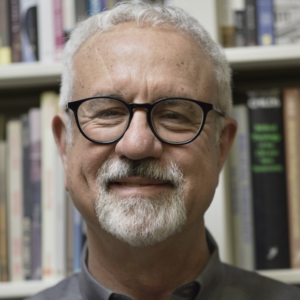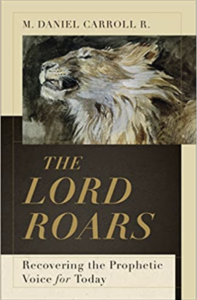About The Lord Roars
A Conversation with Danny Carroll Rodas
Every Voice: What led you to write this book? What problem or issue(s) are you seeking to address?
Danny Carroll Rodas: Actually, the book is based on lectures that I gave for Nazarene Theological Seminary. Because of COVID, the lectures were delivered virtually. The publisher has a contract for the lecture series, so my commitment to give the lectures came with a commitment to write up the lectures. BUT, at the same time, these lectures gave me the opportunity to explore how to read the prophetic books in order to be prophetic today.
EV: What is the thesis of your book?
DCR: The thesis is that we need to learn to read the prophets well as literature to better understand what it means to be prophetic and speak prophetically today. — People use that jargon today, but not all actually look at the prophetic books closely and comprehensively. Nor do people read the prophets as literature, powerful messages couched with amazing literary features to capture and reorient our imagination and lives.
EV: Who’s your target audience, and what are you most hoping they hear from it?
DCR: I have several audiences in mind. On the one hand, I want to offer evangelicals a readable (not too long!) introduction to prophetic ethics that is relevant to current issues. Hopefully, this book can help break some common stereotypes about evangelicals being closed to social issues. A dimension of that goal was citing voices that have been marginalized (Latin American, US Latino/a, African American) in order to highlight their worth and legacy. That is, I want to expose majority culture readers to some of these important voices. At the same time, I want to encourage marginalized voices within evangelicalism by modeling a contextualized, solid work of scholarship, especially for other Latino/a biblical scholars. We have something to say to the broader Christian community!
EV: Did you have any “aha” moments while writing the book?
DCR: Not really. I have been thinking on these matters and on these three prophetic books (Amos, Micah, Isaiah) for a long time. The book provided an opportunity to put those thoughts to paper. The challenge was to communicate what I wanted to say in a readable fashion for a broad audience, which meant not going into too much minutiae and writing a bunch of long footnotes, while at the same time doing good scholarship.
EV: What was the most challenging part of the book to write?
DCR: The most challenging chapter was the concluding chapter on the connections of the prophetic books into the New Testament. The Christian church has wrestled with defining the relationship between the Old and New Testaments for two thousand years, and there are quite a number of options! I wanted to make a basic ethical connection without getting drawn into theological debates that can be divisive and could distract readers from the book’s goals. For that reason, that chapter is limited to the Gospel of Luke and focuses on how Jesus continues the prophetic tasks (which we are to do, too).
EV: If your book was made into a movie, what actor/actress would play the lead role?
DCR: I think if I were to have someone play the role of a prophet, I would pick Denzel Washington. He has the gravitas that is needed to speak these words.
EV: What kind of seminary/church classes should assign your book?
DCR: I think several kinds of classes would find the book insightful. The ones could include courses on Old Testament prophetic literature and Old Testament ethics. The chapter on worship would be helpful for courses on worship. Finally, the book could be used for courses on reading voices from the margins, both for majority culture and minority students.
About Danny Carroll Rodas

M. Daniel Carroll R. (PhD, University of Sheffield) is the Scripture Press Ministries Professor of Biblical Studies and Pedagogy at Wheaton College.

